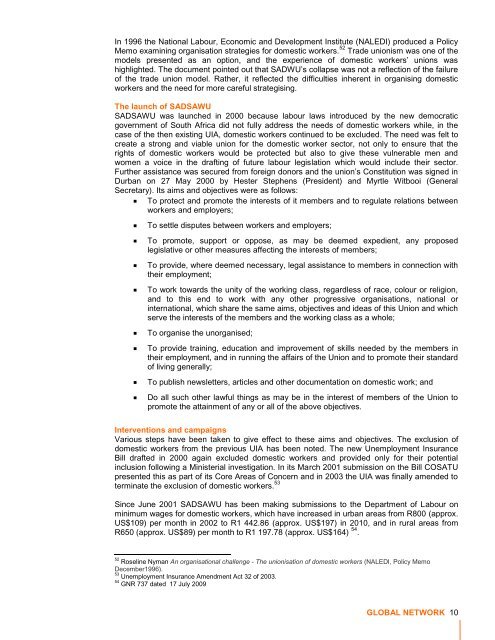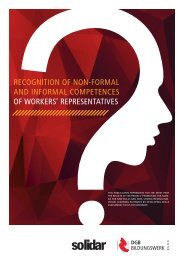domestic workers: decent work for all â south africa - Solidar
domestic workers: decent work for all â south africa - Solidar
domestic workers: decent work for all â south africa - Solidar
You also want an ePaper? Increase the reach of your titles
YUMPU automatically turns print PDFs into web optimized ePapers that Google loves.
In 1996 the National Labour, Economic and Development Institute (NALEDI) produced a Policy<br />
Memo examining organisation strategies <strong>for</strong> <strong>domestic</strong> <strong><strong>work</strong>ers</strong>. 52 Trade unionism was one of the<br />
models presented as an option, and the experience of <strong>domestic</strong> <strong><strong>work</strong>ers</strong>’ unions was<br />
highlighted. The document pointed out that SADWU’s collapse was not a reflection of the failure<br />
of the trade union model. Rather, it reflected the difficulties inherent in organising <strong>domestic</strong><br />
<strong><strong>work</strong>ers</strong> and the need <strong>for</strong> more careful strategising.<br />
The launch of SADSAWU<br />
SADSAWU was launched in 2000 because labour laws introduced by the new democratic<br />
government of South Africa did not fully address the needs of <strong>domestic</strong> <strong><strong>work</strong>ers</strong> while, in the<br />
case of the then existing UIA, <strong>domestic</strong> <strong><strong>work</strong>ers</strong> continued to be excluded. The need was felt to<br />
create a strong and viable union <strong>for</strong> the <strong>domestic</strong> <strong>work</strong>er sector, not only to ensure that the<br />
rights of <strong>domestic</strong> <strong><strong>work</strong>ers</strong> would be protected but also to give these vulnerable men and<br />
women a voice in the drafting of future labour legislation which would include their sector.<br />
Further assistance was secured from <strong>for</strong>eign donors and the union’s Constitution was signed in<br />
Durban on 27 May 2000 by Hester Stephens (President) and Myrtle Witbooi (General<br />
Secretary). Its aims and objectives were as follows:<br />
• To protect and promote the interests of it members and to regulate relations between<br />
<strong><strong>work</strong>ers</strong> and employers;<br />
• To settle disputes between <strong><strong>work</strong>ers</strong> and employers;<br />
• To promote, support or oppose, as may be deemed expedient, any proposed<br />
legislative or other measures affecting the interests of members;<br />
• To provide, where deemed necessary, legal assistance to members in connection with<br />
their employment;<br />
• To <strong>work</strong> towards the unity of the <strong>work</strong>ing class, regardless of race, colour or religion,<br />
and to this end to <strong>work</strong> with any other progressive organisations, national or<br />
international, which share the same aims, objectives and ideas of this Union and which<br />
serve the interests of the members and the <strong>work</strong>ing class as a whole;<br />
• To organise the unorganised;<br />
• To provide training, education and improvement of skills needed by the members in<br />
their employment, and in running the affairs of the Union and to promote their standard<br />
of living gener<strong>all</strong>y;<br />
• To publish newsletters, articles and other documentation on <strong>domestic</strong> <strong>work</strong>; and<br />
• Do <strong>all</strong> such other lawful things as may be in the interest of members of the Union to<br />
promote the attainment of any or <strong>all</strong> of the above objectives.<br />
Interventions and campaigns<br />
Various steps have been taken to give effect to these aims and objectives. The exclusion of<br />
<strong>domestic</strong> <strong><strong>work</strong>ers</strong> from the previous UIA has been noted. The new Unemployment Insurance<br />
Bill drafted in 2000 again excluded <strong>domestic</strong> <strong><strong>work</strong>ers</strong> and provided only <strong>for</strong> their potential<br />
inclusion following a Ministerial investigation. In its March 2001 submission on the Bill COSATU<br />
presented this as part of its Core Areas of Concern and in 2003 the UIA was fin<strong>all</strong>y amended to<br />
terminate the exclusion of <strong>domestic</strong> <strong><strong>work</strong>ers</strong>. 53<br />
Since June 2001 SADSAWU has been making submissions to the Department of Labour on<br />
minimum wages <strong>for</strong> <strong>domestic</strong> <strong><strong>work</strong>ers</strong>, which have increased in urban areas from R800 (approx.<br />
US$109) per month in 2002 to R1 442.86 (approx. US$197) in 2010, and in rural areas from<br />
R650 (approx. US$89) per month to R1 197.78 (approx. US$164) 54 .<br />
52 Roseline Nyman An organisational ch<strong>all</strong>enge - The unionisation of <strong>domestic</strong> <strong><strong>work</strong>ers</strong> (NALEDI, Policy Memo<br />
December1996).<br />
53 Unemployment Insurance Amendment Act 32 of 2003.<br />
54 GNR 737 dated 17 July 2009<br />
GLOBAL NETWORK 10
















